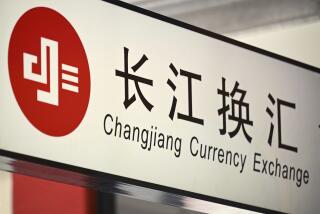China Rousting Street Money-Changers
- Share via
PEKING — Chinese police Monday began chasing black-market money-changers off the streets of Peking, the latest effort to cool the speculative fever that has spread across the country in the early stages of the regime’s economic reform program.
Over the weekend, the State Council, China’s version of a Cabinet, banned the unauthorized purchase or sale of the foreign-exchange certificates that tourists, diplomats and other foreigners here are required to use.
In the last five months, money-changers have been openly and aggressively approaching foreigners in the downtown sections of Chinese cities, offering to buy foreign-exchange certificates at prices well above official rates. These certificates can then be used to buy goods from abroad.
Such transactions were already illegal but police seemed willing to tolerate the exchanges. On Monday, however, police were observed running after and attempting to arrest young Chinese who offered to change money with a foreigner in a section of Peking where many diplomats live.
The prohibition on currency speculation was one of a series of actions the Chinese government has taken in recent days to demonstrate its determination to combat corruption and profiteering by individuals and Chinese enterprises.
Last week, the State Council issued a policy statement regulating the sale of consumer goods such as television sets. These items are in such short supply in China that some individuals and businesses have been hoarding them and selling them for sums well above state-approved prices.
In addition, the State Council warned against unauthorized price increases and set up an inspection system to report on violators.
All these actions appear to be aimed at helping the Chinese regime demonstrate to the public and to skeptical Communist Party officials that it has the economy under tight control as it carries out the reform program announced last October. That program is designed to reduce the role of state planning and gradually let prices be determined by market forces.
The crackdown on the money-changers does not solve China’s currency woes. The underlying problem remains the artificially low value and restrictions on the use of China’s currency, the renminbi.
The renminbi--a generic term for currency roughly similar to “sterling” in Britain--are not freely convertible into dollars or other foreign money. Instead, China as of 1980 began issuing special foreign-exchange certificates to foreigners for their use inside the country. The certificates are prized as a means to buy difficult-to-obtain foreign goods.
More to Read
Sign up for Essential California
The most important California stories and recommendations in your inbox every morning.
You may occasionally receive promotional content from the Los Angeles Times.










